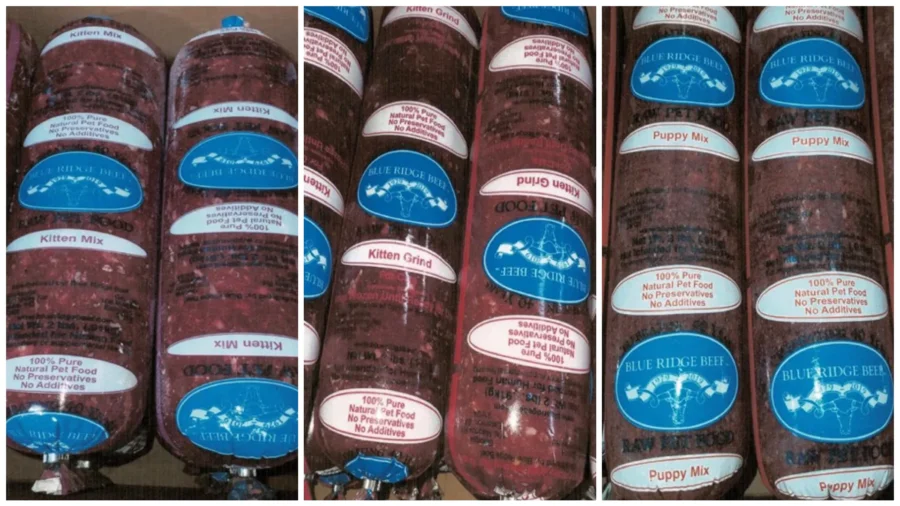Dog and cat food being distributed to multiple states is being recalled due to contamination, according to the U.S. Food and Drug Administration (FDA)
Blue Ridge Beef is recalling multiple lots of cat and dog food because it tested positive for both salmonella and the bacteria that causes listeria, the company said in a statement issued by the FDA. The lots were sold in stores across Connecticut, Massachusetts, Maryland, North Carolina, New York, Pennsylvania, and Virginia.
Blue Ridge Beef did not respond to a request for comment.
One lot each of the company’s Kitten Grind, Kitten Mix, and Puppy Mix products tested positive for salmonella and listeria monocytogenes, the bacteria that causes listeria, Blue Ridge Beef informed North Carolina officials on Dec. 15, 2023.
That prompted the company to issue a voluntary recall of all lots with lot numbers N24 1114 to N24 1224. The products have “use by” dates of Dec. 12, 2024.
Lot numbers and the dates can be found at the end of the product tubes, on silver tabs.
People who bought the products were directed to contact the company to request a full refund. They should also destroy the products so that children, pets, and other animals cannot access them, the FDA said.
Salmonella causes symptoms such as diarrhea, fever, and stomach cramps, and leads to some hospitalizations and deaths each year in the United States. People suffering from food poisoning have often become infected with salmonella.
Listeria, which affects a much smaller number of people each year, causes symptoms like fever and loss of balance.
Both bacterial diseases typically infect humans who handle or ingest contaminated food.
Animals can also become infected.
“Salmonella and listeria monocytogenes can affect animals eating the products and there is risk to humans from handling contaminated pet products, especially if they have not thoroughly washed their hands after having contact with the products or any surfaces exposed to these products,” the FDA said.
People who think they’ve become infected were encouraged to contact their doctor.
Infected pets may display symptoms such as diarrhea, fever, vomiting, and lethargy. Pets who consumed the recalled products and are showing symptoms can be taken to a veterinarian.
Blue Ridge says on its website it makes 100 percent “pure raw pet food,” with no preservatives or additives.” The company says it is family-owned and -operated, and that it is “committed to providing the best nutritional quality raw food, price, and service.”
The FDA previously told Blue Ridge Beef that the company was not meeting inspection regulations.
“Your firm utilizes tissues from animals that have died otherwise than by slaughter in the manufacturing of pet food without first determining whether the animals suffered any type of illness, injury, and/or whether any medications may have been administered to the animals prior to your pick up from the supplier and subsequent use in manufacturing, such that tissues from the animals would be unsuitable for manufacturing and processing into your pet food,” an FDA warning letter stated.
An inspection of the company’s facility in Statesville, North Carolina found there were violations of handling regulations, including pools of water seen on concrete floors of rooms where animals were held and killed.
The FDA also tested some ingredients and products and one sample returned positive for salmonella while another tested positive for salmonella and listeria monocytogenes.
Blue Ridge took corrective actions following the inspection, including voluntarily destroying a lot that tested positive for the bacteria and promising to improve procedures found deficient, the FDA said.
“You also indicated that you are researching methods to address pathogen contamination. You described additional corrective actions which include equipment and utensil cleaning and providing instructions to employees for handling raw material in your facility, such as instructing employees to put any animal food that touches the floor in a container for disposal,” the FDA said.
Regulators said the response did not show whether the problems would be resolved and adherence would be evaluated during the next inspection. The FDA has not issued a similar warning letter since.
From The Epoch Times

